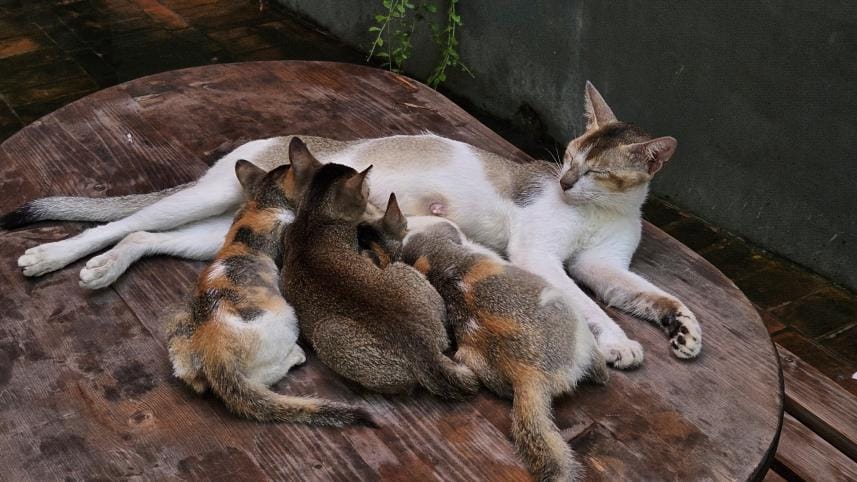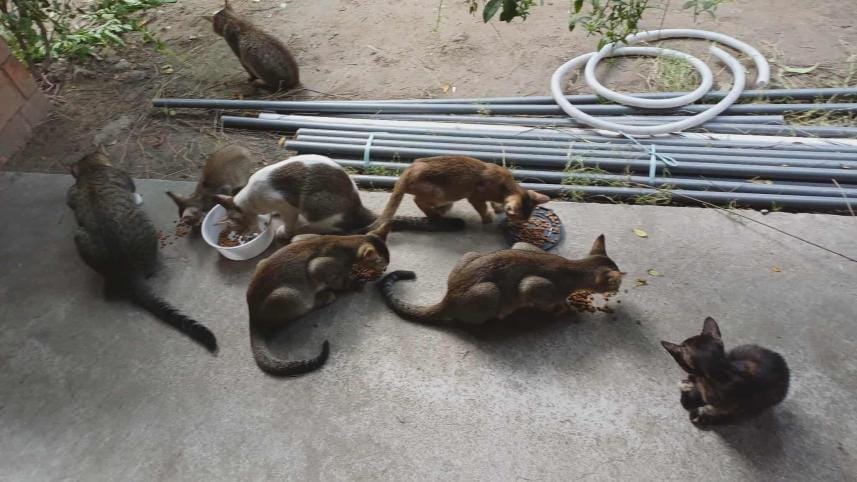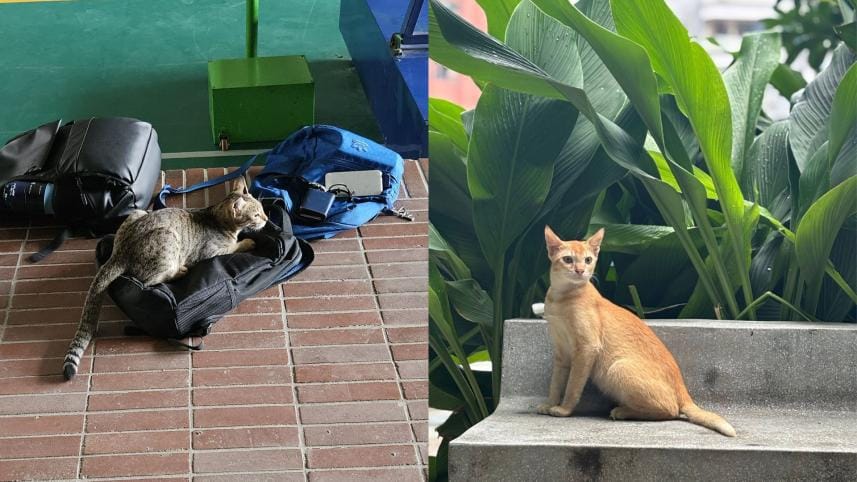What happened to the BRAC Univ cats?

Once a source of comfort and companionship for many BRAC University students, the campus cats had long been part of their life. Their sudden disappearance in recent days has sparked concern and curiosity among former companions.
"There used to be many cats on campus. At first, there were only a few, but gradually their number increased as they had kittens and formed small groups in different areas. There was a bushy patch near Gate 2 and another beside Arabika, the coffee shop, both home to several cats," said Kaniz Fatama Zabin, a 10th-semester student of architecture.
Zabin says, the concern began when a few cats were seen inside the sixth-floor cafeteria. "Someone took a photograph of a cat eating leftover food from a table, which led to discussions about hygiene. Soon it turned into a debate — cat lovers versus cat haters," she said.
"On October 27, we noticed that several kittens and the friendlier cats had disappeared. They were often seen along the walkways, and students used to feed them. Later, some of the missing cats were reportedly spotted near the Rampura U-loop."
But Zabin was not sure whether some students had moved the cats or the university authority.

Local shopkeepers in Rampura also claimed that a number of cats had been abandoned there but it could not be independently verified.
"At least 13 cats have reportedly gone missing from the university — one from the cafeteria, three from Arabika, and nine from the gardens. Those are the ones I know of, perhaps one or two more. But I can confirm at least that many cats have disappeared," said Hameem Sharar Juveen, a math undergrad.
"Right now, it is confirmed that five adult cats and two kittens remain on campus. On the 27th, we realised that many of the cats were no longer around," he added.
"My campus once felt like a piece of heaven with the gentle presence of cats. I used to spend a lot of time with them before class, and they never harmed anyone," said Sadab Anjum Aurpa, another student.
"Those tiny paws, soft purrs, and the little weight on my lap always brought me comfort and joy."
A student, who wished to remain anonymous, said a lead came from a social media post last Thursday. "She spotted one of our missing campus cats and, with the help of a few others, managed to locate two more adult cats from our campus near the Badda U-loop, around 300 metres away."

Students also said cats are now not allowed in the cafeteria following complaints of allergies, though they can still be seen elsewhere on the premises.
So far, no official statement has been issued by BRAC University regarding how many cats, if any, have been removed.
Some students said complaints were raised about cats entering the cafeteria, while others noticed an increase in anonymous posts online expressing hostility towards cats or mocking efforts to raise funds for injured animals.
"There's been talk about cats being seen in the cafeteria, but it was always just Bagha — the one who used to roam around the upper floors, cafeteria, and classrooms," said another student.
Another student said, "Today I saw a guard trying to kick a small black-and-white kitten out through the pocket gate. When I confronted him, he claimed he was only trying to remove the cat from around the gate."
Ahan Abrar, a biotechnology student, said, "BRAC University showed immense courage and humanity during the July protest. But when it came to showing compassion towards voiceless, innocent animals like these cats, the same university turns inhuman."
Students also recalled similar incidents involving campus dogs earlier in 2024. Before July last year, there were reportedly about 25 dogs living in the open area behind the main building, near a small lake and several trees. Some students had even named them — Tango, Coco, and Amy — and took responsibility for feeding them daily.
"When the campus reopened after July, we couldn't see our dogs," said one student.
Ahsanuzzaman Chowdhury, owner of the shelter Animal Haven, told The Daily Star that BRAC University had contacted him during the July uprising last year to safely relocate the campus dogs. As the university remained closed for nearly a month, the dogs faced a severe shortage of food. He said the university paid Tk 2,700–3,000 per dog for one month and about 25 to 26 dogs were rescued.
"The university's intentions were good," he said. "Since there was no way to manage food for the dogs on campus, they took this step out of concern for student safety and the animals' welfare."
The university issued a statement at 10:30am today, reaffirming its commitment to humane and responsible care for animals. The university acknowledged recent concerns about free-roaming cats and outlined steps being taken to ensure both community safety and animal welfare. These include relocating cats from "high-traffic sensitive" areas, partnering with animal-welfare organisations for fostering and adoption, and encouraging students to adopt if they wish.
"Over recent months, we have received reports from students and staff regarding free-roaming cats—including occasional scratches and bites, hygiene concerns around food and learning spaces, and potential health risks," it said.
The university emphasised that while many care deeply for these animals, consistent feeding and veterinary support are beyond its current capacity.




 For all latest news, follow The Daily Star's Google News channel.
For all latest news, follow The Daily Star's Google News channel.
Comments